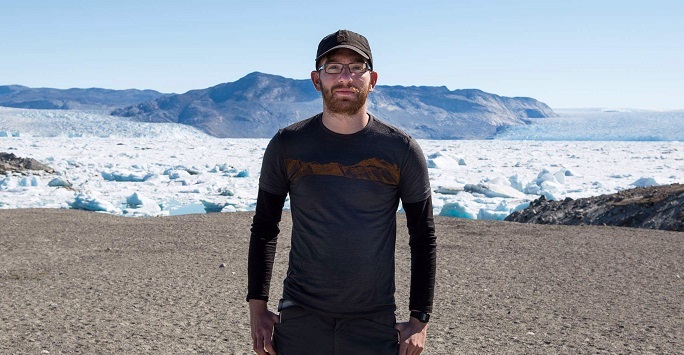Meet Professor James Lea (he/him)
Professor of Glaciology and UKRI Future Leaders Fellow, James Lea, explores the past, present, and future behaviour of glaciers, using innovative techniques to understand their impact on people and the environment.
Born – Blackpool, United Kingdom
PhD – University of Aberdeen, United Kingdom
Joined University of Liverpool – 2016
Position – Professor of Glaciology and UKRI Future Leaders Fellow

What is your research about?
My research seeks to understand the past and present behaviour of glaciers, and increasingly how their future behaviour will impact people at local and global scales.
What or who first inspired you to be interested in your research subject?
I sort of fell into studying glaciers by accident, though it was probably inevitable once I stood on one for the first time during my geography undergraduate field trip to Switzerland. I was 19 and had never had the chance to go abroad before, but being stood on a huge chunk of ice in a landscape like that for the first time was something else.
Having said that, it still took me a while to commit to glaciology after that. Glaciology was actually my worst paper at undergraduate level! I did my master’s in quaternary science which looked at environmental change over the last 2.5 million years, at which point the glacial stuff finally just clicked with me. Since then, my PhD took in everything from Viking archaeology and sedimentology, to satellite imagery and numerical modelling to understand glacier change in Greenland over the last 250 years. It’s a bit of a weird Venn diagram of research areas but was surprising how they have been (and continue to be) relevant to what I do.
What are you most proud of achieving during your research career so far?
I think it would have to be developing cloud computing based research tools for rapidly analysing satellite imagery that are now also used in high school and undergraduate teaching. Creating something that has been useful for the research community and also helps to engage the next generation has been really satisfying.
What techniques and equipment do you use to conduct your research?
I’m both field and desk based in my research, so it’s quite a range. We currently have time lapse cameras overlooking an iceberg calving glacier in Greenland, and work with weather station and GPS data. I’ve also done work hiking miles and miles to dig holes to look for evidence of past glacier behaviour where the most important bits of kit are mosquito repellent, decent boots and pointing trowel. A lot of my recent work is computer based and relies on coding, so an internet connection and access to StackOverflow is a must.
Which other subjects are important for your research?
Environmental science is a fantastic mix of processes that have impacts at all sorts of different spatial scales and different lengths of time. If pushed though, for my current work I would probably say physics and computer science are of key importance, though keeping an eye on the other stuff can sometimes throw up surprises, and you can never escape the importance of understanding the human dimension too. Some of the most eye-opening collaborations I’ve had have been with colleagues in Liverpool and elsewhere who are social scientists, archaeologists and biologists, where you have your perspective shifted or they open up totally new approaches to existing problems in the field that are plainly obvious to them, but would never have thought of otherwise.
What is the key to running a successful research group?
For me, it’s about creating an environment that is inclusive, empathetic, and supportive to those in it. Things in research rarely go precisely to plan, so being able to freely share and discuss issues that crop up often mean that they get dealt with more quickly or can be mitigated. Consequently, when problems inevitably appear they can be shared, overcome and progress can be made.
What impact is your research having outside of academia?
We’re currently working with the Greenland Government’s geoscience consultancy to determine potential risks to shipping from marine terminating glaciers that may destabilise, and also monitor conditions in fjords to help improve safety for local boat traffic. As the Northwest Passage becomes more easily navigable it’s likely that this is going to be of increasing importance to global shipping between the Atlantic and Pacific in the coming years.
How do you plan to develop your research in the future?
A lot of my work recently has been setting up workflows for automating image analysis. The next step is applying these at regional or even global scale, and have them update in real time as new satellite data come in.
What problem would you like to solve in the next 10 years through your research?
Understanding iceberg calving and (in)stability of calving glaciers has been a common theme of my research since my PhD. I’m not sure it will ever be “solved” but I’m hoping to make a hefty dent into it.
What advice would you give to someone considering a career in research?
Challenge yourself to do things that you don’t think you will be able to do. You might not always succeed, but occasionally you will.
Environmental science is a fantastic mix of processes that have impacts at all sorts of different spatial scales and different lengths of time.